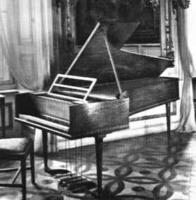 Bart Collins offers the usual tour of fascinating piano destinations on his Well-Tempered Blog, including a trip to Maison Erard, and a look at this 1803 piano of Beethoven's, thanks to a link to Stephen Birkett's web page. There you'll find the bright, near-giddy sound of an 1822 Erard. And Bart gets you to the Chopin Competition, mp3 breast implants, and Beethoven's newly unearthed four-hand manuscript of the Grosse Fuge ...
Bart Collins offers the usual tour of fascinating piano destinations on his Well-Tempered Blog, including a trip to Maison Erard, and a look at this 1803 piano of Beethoven's, thanks to a link to Stephen Birkett's web page. There you'll find the bright, near-giddy sound of an 1822 Erard. And Bart gets you to the Chopin Competition, mp3 breast implants, and Beethoven's newly unearthed four-hand manuscript of the Grosse Fuge ...It often happens that I'll be stunned by music while doing the broadcaster's dance (taking transmitter readings, signing logs, searching for that pithy segue)... Today pianist Randall Hodgkinson's resonant and genuine way with the first three Moments Musicaux of Schubert drew me to a place far, far, far from the relentless clock (the one that wags its merciless finger at every soul who sits in front of a microphone) ...
The thing to do when such a sweet, inspired moment arrives is to crank up the studio speakers and get the ON-AIR light glowing at every door ... so no one dares to interrupt.

